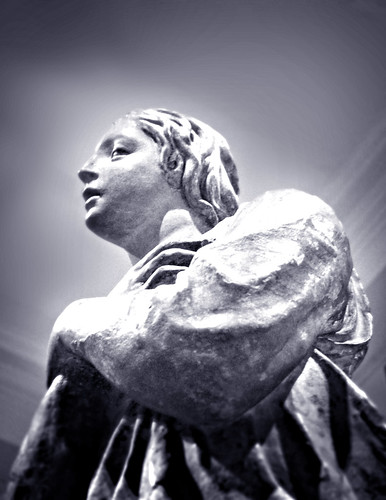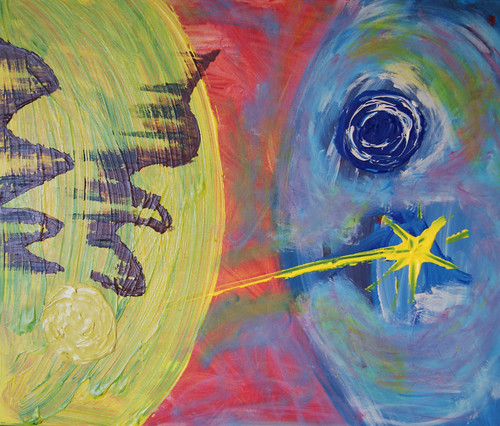The following is a reflection on Luke 1:26-38, the Gospel Lesson appointed for December 18th, 2011, the Fourth Sunday of Advent, Year B according to the New Revised Common Lectionary. On this site there is also
• a version of the Prayers of the People for Advent 4B.
She was twelve. Maybe thirteen.
That was the typical age of betrothal in her day. And, this little twelve-year-old was betrothed to a man.
I remember being twelve. It’s a great age. It’s also a difficult age. Everything changes almost every day. The ground moves under your feet with the constancy of waves on a beach.
Each change just comes, one after another. Before you’ve adjusted to one change, one more sweeps over you. And no force can stop them.
It’s one of those liminal times in life. A between time.
No longer a child. Not yet an adult.
Somewhere in the middle.
That’s part of what makes it so hard.
Full of life. Awkward. Fun. Goofy. Girly. Womanly. Perfect as she could be in every way.
Then an angel of the Lord appeared to her. And, in one instant there went childhood.
Over. Done.
That one brush with heaven changed it all.
Mary, or Miriam as she would have been known, was one person in a long line of people who encountered God, and in the blink of an eye saw the trajectory of their lives change.
Abraham had to pick up and move away from the land of his fathers, and raise a child in his twilight years. Moses found a bush on fire, and ended up speaking before the principalities of this world on behalf of the Principality of the Cosmos. Joshua. Deborah. Gideon. Samson. Saul. David, the youngest boy in a long line of brothers – he was just watching sheep one day when someone called him in from the field. Isaiah. Jeremiah.
And then Mary.
But, God didn’t ask her to go anywhere. Or speak to anyone. Or liberate a nation of slaves.
God asked her to have a child.
His child.
Which is big, for sure. But, were God to ask me to do this for Him, the first thought which would pass through my mind would be: Oh, but my parents are going to kill me.
She was unmarried. Promised to a man.
How could she do this without disappointing everyone? Ev-er-y-one.

A figure of Gabriel, from an Annunciation scene, but where Mary has gone missing. Lucca, ca. 1493. MMA. Photo by Rick Morley.
Her father. Her mother. Her aunts and uncles. Her rabbi. The people of her town.
She lived in a small town—one of those places where everyone knows everything about every single person.
Oh, the things people would think about her. And if those thoughts turned to anger, and anger turned them to God’s righteous laws, she could have been stoned to death.
And, yes, of course, this was to be no ordinary child born out of wedlock. This was an act of God.
But who on earth would believe THAT line?
And there stood that angel of the Lord sent to a little girl, almost a woman, asking her to radically bend the arc of her life away from where she thought it might go to somewhere she never dreamed.
If angels “feel,” I wonder if Gabriel felt a little bad? There he was, bathed in divine light, rippling robes, bright colored wings, shiny halo—asking a twelve-year-old girl to do something he couldn’t dream to do. Something he, with all his power and prominence, was powerless to accomplish.
Let it be done with me according to your word.
I don’t think she actually said that. My guess is that somehow she managed to squeak out a “ok…”
That’s all I’d be able to summon, three times her age.
But, whatever she said, she agreed to go through with it. And, unlike her biblical ancestors she didn’t try and wiggle out of it. Unlike Moses, she didn’t try and say that she had a speech impediment. Unlike Jonah, she didn’t hop on a boat in the opposite direction. Unlike Abraham and Sarah, she didn’t laugh.
She said “yes.”
Mary, in the annunciation, becomes the patroness of all youth and young people. She tells all of us that God can ask great things of the young, and the young can accomplish those things. Mary wasn’t a “future” faithful young woman, she was at twelve or thirteen already a faithful woman.
Mary, in the annunciation, becomes the patroness, of all who are called by God to do impossible things. Of those who become embarrassments to their family and communities on behalf of God. She reminds us that the godly thing isn’t always the prim-and-proper thing. Sometimes when we answer God’s call, we become a laughingstock. Or, even worse, persecuted.
Mary, in the annunciation, becomes the patroness of all who dare say “yes” to God. Or, manage to mumble a tentative “…ok…”
In this scene where the divine comes crashing into the earth, Mary becomes our example, that in the ways of God we might become like her.
If we have the guts.

4 Comments